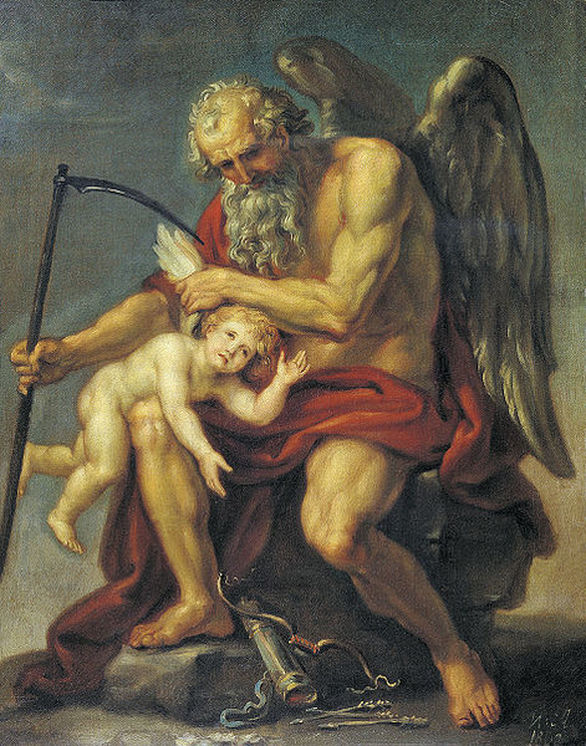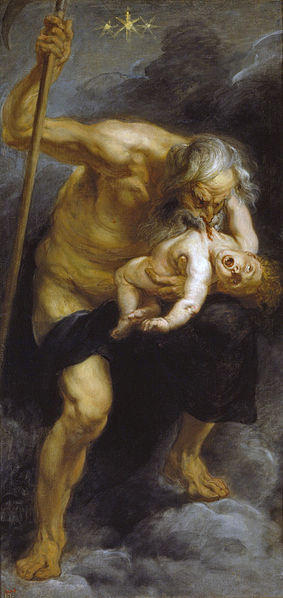THE GOD CRONUS IN GREEK MYTHOLOGY
Today, many people’s concept of Greek mythology revolves around Zeus and the other gods of Mount Olympus. The Olympian gods though were only the third generation of gods, and were preceded by the Protogenoi, who themselves were succeeded by the Titans. The time of the Titans was the Golden Age of Greek mythology, and was a period when the cosmos was overseen by the Titans, including their leader Cronus.
Cronus not Chronus
Cronus might also be known as Chronos or Kronos, depending on the English translation, and as a result it is common to find Cronus being confused with Chronus, the Primordial god of Time.
Cronus and Chronus though, were two separate deities, and in truth, Cronus, is the more significant of the two. |
|
Cronus in Greek mythology
Cronus was a son of Ouranus (Sky) and Gaia (Earth), and sibling to five brothers and six sisters, the Titans. The male Titans were Cronus, Iapetus, Oceanus, Hyperion, Crius and Coeus, whilst the females were Rhea, Themis, Tethys, Theia, Mnemosyne and Phoebe.
The Titans though were far from being the first children for Ouranus, who was at the time, the supreme ruler of the cosmos. Previously, Gaia had given birth to the three gigantic Hecatonchires, and the three Cyclopes.
Fearful for his own position, Ouranus had imprisoned the Hecatonchires and Cyclopes in Tartarus, so that they could not challenge him. Ouranus though, was less fearful of the Titans, and this set of 12 gods and goddesses remained free.
The Titans though were far from being the first children for Ouranus, who was at the time, the supreme ruler of the cosmos. Previously, Gaia had given birth to the three gigantic Hecatonchires, and the three Cyclopes.
Fearful for his own position, Ouranus had imprisoned the Hecatonchires and Cyclopes in Tartarus, so that they could not challenge him. Ouranus though, was less fearful of the Titans, and this set of 12 gods and goddesses remained free.
cronus comes to power
Gaia though initiated an uprising against Ouranus, and Cronus was convinced to wield an adamantine sickle against his father, castrating Ouranus.
The Titans were now in charge of the cosmos, and having delivered the cutting blow, Cronus took up the mantle of supreme deity. The Titans would rule in pairs, and Cronus would pair up with Rhea. The rule of Cronus and the Titans was considered to be the “Golden Age”, a bountiful age, where everyone prospered, and yet in later Greek mythology, Cronus was considered to be a cruel and ruthless ruler. Certainly, Cronus was as fearful of his position as Ouranus had been, and so the Titan lord would keep the Cyclopes and Hecatonchires imprisoned. |
the downfall of cronus
|
During this time Cronus and Rhea would become parents to six children; Demeter, Hera, Hades, Hestia, Poseidon and Zeus.
Cronus though, was not going to make the same mistake as his father, and so as Rhea gave birth to each child, Cronus would take it, and swallow it, imprisoning the child within his stomach. A prophecy was also made that a child of Cronus would overthrow him, and so Cronus sought to circumvent this prediction. Cronus was angering both Gaia and Rhea, and so when Zeus was born, instead of giving him over the Cronus, Zeus was secreted off to Crete; and a large stone, wrapped in cloth, was swallowed in his place. On Crete, Zeus would grow up, and finally be of strength to challenge his father. Firstly, Cronus was given a poison to force the Titan lord to regurgitate his imprisoned children, and now Zeus had a fighting force to challenge the Titans. Zeus’ army swelled as the Cyclopes and Hecatonchires were released from Tartarus, and so began a ten year war, the Titanomachy. Zeus would make his base on Mount Olympus, whilst the Titans were based on Mount Othrys. Generally speaking, the Titans were stronger, but Zeus had cunning on his side. Cronus himself did not lead the Titans on the battlefield, and this honour was left to the stronger and younger Atlas. Eventually though, the prophecy would come true for the Titans were beaten. |
|
Zeus would now mete out punishment to his enemies, including Cronus, and in most versions of the tale, Cronus was imprisoned for eternity in Tartarus; although in a few versions Cronus is forgiven and made king of the Elysian Fields.
This idea of redemption is taken further by the Romans, who incorporate the god into their own pantheon as the god Saturn. Saturn though, was far more widely worshipped by the Romans than the god Cronus had ever been.
This idea of redemption is taken further by the Romans, who incorporate the god into their own pantheon as the god Saturn. Saturn though, was far more widely worshipped by the Romans than the god Cronus had ever been.

